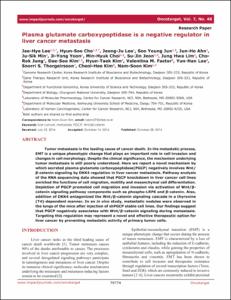KUMEL Repository
1. Journal Papers (연구논문)
1. School of Medicine (의과대학)
Dept. of Molecular Medicine (분자의학)
Plasma glutamate carboxypeptidase is a negative regulator in liver cancer metastasis
- Keimyung Author(s)
- Lee, Yun Han
- Department
- Dept. of Molecular Medicine (분자의학)
- Journal Title
- Oncotarget
- Issued Date
- 2016
- Volume
- 7
- Issue
- 48
- Keyword
- liver cancer; metastasis; PGCP; Wnt/β-catenin
- Abstract
- Tumor metastasis is the leading cause of cancer death. In the metastatic process, EMT is a unique phenotypic change that plays an important role in cell invasion and changes in cell morphology. Despite the clinical significance, the mechanism underlying tumor metastasis is still poorly understood. Here we report a novel mechanism by which secreted plasma glutamate carboxypeptidase(PGCP) negatively involves Wnt/β-catenin signaling by DKK4 regulation in liver cancer metastasis. Pathway analysis of the RNA sequencing data showed that PGCP knockdown in liver cancer cell lines enriched the functions of cell migration, motility and mesenchymal cell differentiation. Depletion of PGCP promoted cell migration and invasion via activation of Wnt/β-catenin signaling pathway components such as phospho-LRP6 and β-catenin. Also, addition of DKK4 antagonized the Wnt/β-catenin signaling cascade in a thyroxine (T4)-dependent manner. In an in vivo study, metastatic nodules were observed in the lungs of the mice after injection of shPGCP stable cell lines. Our findings suggest that PGCP negatively associates with Wnt/β-catenin signaling during metastasis. Targeting this regulation may represent a novel and effective therapeutic option for liver cancer by preventing metastatic activity of primary tumor cells.
- Keimyung Author(s)(Kor)
- 이윤한
- Publisher
- School of Medicine
- Citation
- Jae-Hye Lee et al. (2016). Plasma glutamate carboxypeptidase is a negative regulator in liver cancer metastasis. Oncotarget, 7(48), 79774–79786. doi: 10.18632/oncotarget.12967
- Type
- Article
- ISSN
- 1949-2553
- Appears in Collections:
- 1. School of Medicine (의과대학) > Dept. of Molecular Medicine (분자의학)
- 파일 목록
-
-
Download
 oak-2017-0347.pdf
기타 데이터 / 11.77 MB / Adobe PDF
oak-2017-0347.pdf
기타 데이터 / 11.77 MB / Adobe PDF
-
Items in Repository are protected by copyright, with all rights reserved, unless otherwise indicated.